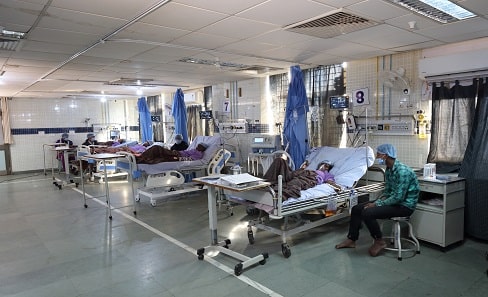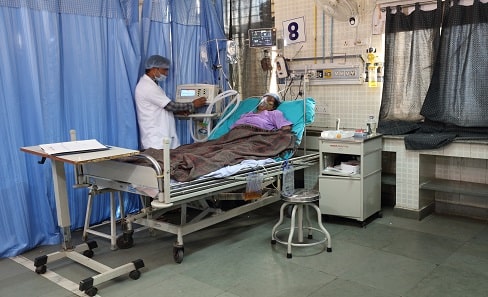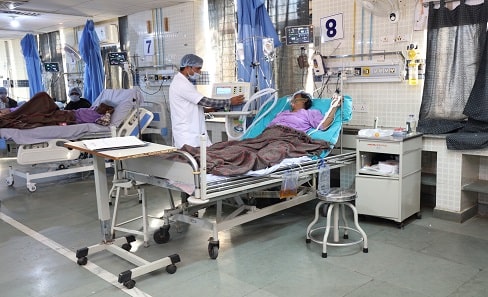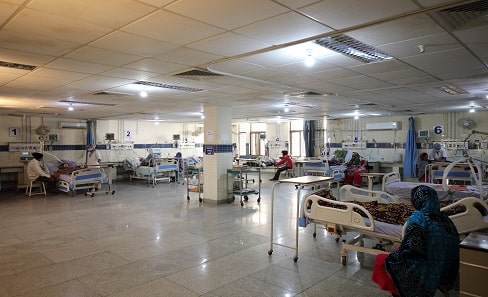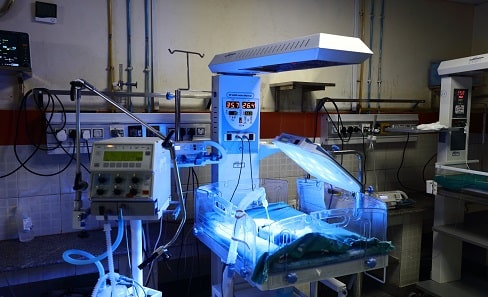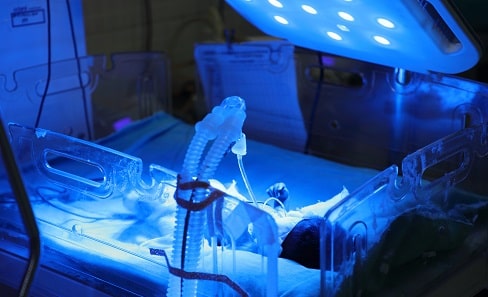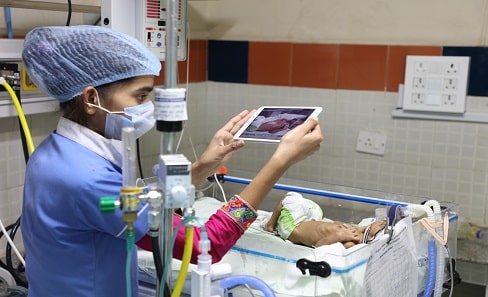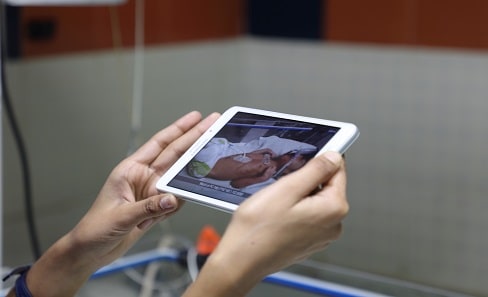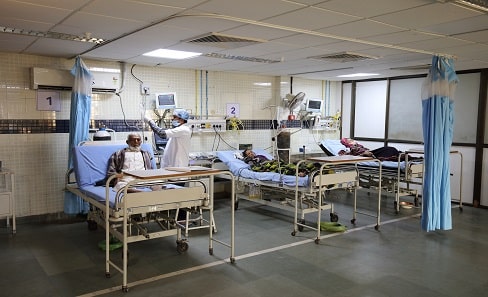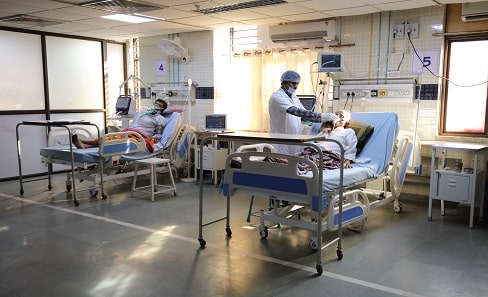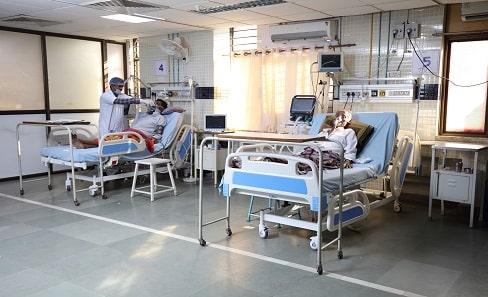MICU
The Medical Intensive Care Unit (MICU) is a specialized hospital ward that provides intensive care treatment to patients with severe medical conditions. GAIMS having a Fully equipped 8 bedded MICU with 2 Isolation room. These conditions often require intensive monitoring and advanced medical interventions.
- Respiratory Failure: Conditions like chronic obstructive pulmonary disease (COPD), asthma, pneumonia, or other issues that cause significant breathing difficulties.
- Sepsis: A severe response to infection that can lead to organ failure.
- Heart Conditions: Acute myocardial infarction (heart attack), congestive heart failure, arrhythmias, etc.
- Neurological Conditions: Stroke, seizures, encephalitis, or other serious neurological conditions.
- Renal Failure: Severe kidney problems requiring dialysis.
- Metabolic Disorders: Issues like diabetic ketoacidosis or severe electrolyte imbalances.
- The MICU is staffed by a multidisciplinary team of healthcare professionals, including intensivists (physicians specialized in critical care), nurses, respiratory therapists, pharmacists, and other specialists.
- These units are equipped with advanced medical equipment for monitoring and treating patients, such as ventilators, Multipara monitor, Defibrillator, Central Oxygen and Suction line, and more. The focus is on close monitoring and aggressive treatment to stabilize patients and address the underlying medical issues.
SICU
Surgical Intensive Care Unit (SICU) is a specialized hospital unit that provides intensive care and monitoring for patients who have undergone surgical procedures or who require close observation and management due to surgical complications. GAIMS having a Fully equipped 8 bedded SICU. The SICU plays a crucial role in the recovery and stabilization of patients who require intensive postoperative care and monitoring.
- Patients in a SICU may include those recovering from major surgeries, trauma, or complex surgical procedures. They often require intensive monitoring, advanced life support, and specialized medical care.
- The SICU is staffed with a team of healthcare professionals, including surgeons, critical care physicians, nurses, respiratory therapists, and other specialists. These professionals work together to provide continuous monitoring of vital signs, administer medications, manage pain, and provide other necessary interventions.
- The SICU is equipped with advanced medical equipment and technology, such as ventilators, infusion pumps, and monitoring devices, to support critically ill patients. This equipment helps in closely monitoring patients' conditions and providing life-saving interventions when needed.
- One of the primary functions of the SICU is to manage postoperative care, including pain control, wound care, and the prevention and management of complications such as infections, bleeding, and organ dysfunction.
- The length of stay in the SICU can vary depending on the patient's condition, response to treatment, and overall recovery. Once patients are stable, they may be transferred to a less intensive care unit or a regular hospital ward for continued recovery
PICU
A Pediatric Intensive Care Unit (PICU) is a specialized hospital area designed to provide intensive
medical care and monitoring for critically ill infants, children, and adolescents. The goal of the PICU is to
stabilize critically ill children, provide specialized care, and support their recovery, whether that means
returning to their regular life or transitioning to other levels of care within the hospital.
- The PICU is staffed by a multidisciplinary team of healthcare professionals, including pediatric intensivists,
nurses, respiratory therapists, and other specialists trained to handle the unique needs of young patients.
- GAIMS having a Fully equipped 8 bedded PICU. The PICU plays a crucial role in the recovery and stabilization of
patients who require intensive care and monitoring.
- PICUs are equipped with state-of-the-art technology for continuous monitoring of vital signs, such as heart
rate, blood pressure, oxygen levels, and respiratory function.
- The unit provides care for a wide range of conditions, including respiratory distress, severe infections,
post-surgical recovery, trauma, congenital anomalies, and chronic illnesses that require intensive monitoring
and intervention.
- Care in a PICU involves collaboration among various healthcare professionals, including pediatric intensivists
(specialists in critical care for children), pediatricians, surgeons, anesthesiologists, nurses, respiratory
therapists & pharmacists.
- PICUs often emphasize the importance of involving the family in the care process, offering support services and
accommodations to help families stay close to their hospitalized children.
- The PICU operates around the clock, with staff available always to provide immediate care and interventions as
needed.
- The PICU is equipped with advanced medical technology to support patient care, including ventilators,
defibrillators, and monitoring systems for vital signs, Central oxygen and suction lines.
Emergency ICU
An Emergency ICU (Intensive Care Unit) is a specialized hospital department designed to provide intensive treatment and monitoring to patients with severe and life-threatening conditions that require immediate medical attention.
- GAIMS having 8 Bedded Emergency ICU near to Emergency Medicine department at Ground Floor.
- It combines the functions of an emergency department and an intensive care unit, allowing for rapid intervention and continuous monitoring.
- Patients in an Emergency ICU may be suffering from critical conditions such as heart attacks, strokes, severe injuries, respiratory distress, or other serious illnesses
- The unit is staffed by a multidisciplinary team, including emergency physicians, critical care specialists, nurses, and other healthcare professionals trained to handle a wide range of medical emergencies.
- The Emergency ICU is equipped with advanced medical technology to support patient care, including ventilators, defibrillators, and monitoring systems for vital signs, Central oxygen and suction line.
- Emergency ICU having a facility for Bed side Radiology investigation along with ABG machine for rapid intervention.
- The goal is to stabilize patients, provide life-saving treatments, and, when necessary, prepare them for further specialized care or surgery.
- Once patients are stable, they may be transferred to a less intensive care unit or a regular hospital ward for continued recovery
